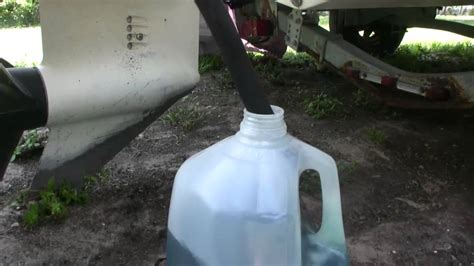How To Get Water Out Of Boat Gas Tank
Ronan Farrow
Mar 31, 2025 · 3 min read

Table of Contents
How to Get Water Out of Your Boat's Gas Tank
Finding water in your boat's gas tank is a frustrating and potentially damaging experience. Water can lead to engine problems, corrosion, and ultimately, a ruined boating trip. Luckily, there are several methods to remove water from your boat's gas tank, and this guide will walk you through them. We'll cover prevention strategies, too, so you can avoid this issue in the future.
Understanding the Problem: Why is Water in My Gas Tank?
Before diving into solutions, let's understand why water ends up in your gas tank in the first place. Several factors contribute to this problem:
- Condensation: Temperature changes within the tank can cause condensation, leading to water accumulation.
- Leaking Fuel Fill: A compromised fuel fill cap or a crack in the tank itself can allow water to seep in.
- Submerged Fuel Intake: If your boat is submerged, even partially, water will inevitably enter the tank.
- Poor Quality Fuel: Contaminated fuel from a gas station can contain water.
How to Remove Water from Your Boat's Gas Tank
There are several methods for removing water from your boat's gas tank, ranging from simple siphoning to more involved techniques. Choose the method that best suits your skills and the severity of the water contamination.
Method 1: Siphoning (For Small Amounts of Water)
This is the simplest method, suitable for removing small amounts of water. You'll need a siphon hose and possibly a clean container.
- Safety First: Always work in a well-ventilated area and wear appropriate safety gear. Gasoline fumes are flammable and harmful.
- Careful Siphoning: Carefully siphon the fuel, ensuring you stop before you draw up sediment. The water is generally at the bottom of the tank.
Method 2: Using a Water Separator Filter
A water separator filter is designed to remove water from fuel before it reaches your engine. Many boats are equipped with these filters. If you have one, make sure it's properly installed and functioning. Regular maintenance and replacement are essential to maintaining effectiveness.
Method 3: Complete Tank Cleaning (For Significant Water Contamination)
If you have a significant amount of water or suspect extensive contamination, this more involved approach is necessary. This typically involves:
- Draining the Tank: Completely drain the tank using the appropriate drain valve.
- Cleaning the Tank: Carefully clean the interior of the tank to remove sediment and residual water. This may involve specialized cleaning agents and thorough rinsing.
- Refilling with Fresh Fuel: After cleaning, refill the tank with fresh, high-quality fuel.
Note: This method often requires professional assistance, especially for larger tanks.
Method 4: Fuel Additives (Preventive Measure)
Fuel additives can help absorb water and prevent future contamination. These additives are readily available at marine supply stores. They often contain chemicals that bind with the water, making it easier to remove with a water separator filter.
Preventing Water in Your Boat's Gas Tank
Prevention is always better than cure. Here are some tips to minimize the risk of water in your boat's fuel tank:
- Regular Inspections: Regularly inspect your fuel tank, lines, and fill cap for leaks or damage.
- Use High-Quality Fuel: Purchase fuel from reputable gas stations known for clean fuel.
- Proper Storage: Store your boat properly to minimize condensation.
- Fuel Stabilizer: Use a fuel stabilizer, especially during periods of inactivity, to prevent the growth of microorganisms that can contribute to water contamination.
Conclusion
Dealing with water in your boat's gas tank is a common problem, but with the right approach, it's manageable. By understanding the causes, employing appropriate removal methods, and implementing preventive measures, you can ensure your boat's engine runs smoothly and avoid costly repairs. Remember safety is paramount when working with gasoline. If you're unsure about any aspect of this process, consult a qualified marine mechanic.
Featured Posts
Also read the following articles
| Article Title | Date |
|---|---|
| How To Freeze Smoked Salmon | Mar 31, 2025 |
| How To Grow Azurescens | Mar 31, 2025 |
| How To Fix A Soft Spot On A Boat Floor | Mar 31, 2025 |
| How To Fix A Leaking Push Fit Joint | Mar 31, 2025 |
| How To Fight An Ejectment Nj | Mar 31, 2025 |
Latest Posts
-
How To Sell A Mobile Home In Texas
Apr 02, 2025
-
How To Sell A Lawn Care Business
Apr 02, 2025
-
How To Sell A Gun In Illinois
Apr 02, 2025
-
How To Sell A Car With A Title Loan
Apr 02, 2025
-
How To Sell A Boat In Louisiana
Apr 02, 2025
Thank you for visiting our website which covers about How To Get Water Out Of Boat Gas Tank . We hope the information provided has been useful to you. Feel free to contact us if you have any questions or need further assistance. See you next time and don't miss to bookmark.
